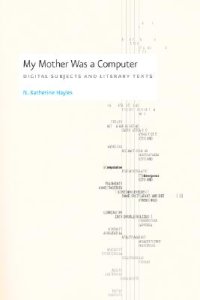
Can one ever go wrong with a Katherine Hayles text? Even if you don't agree with it at the very least it provokes thought on the big issues. I finished My Mother was a Computer yesterday after taking my time with it in between other reads. This book covers a lot of ground, from the ontological implications of cellular autonoma to the metaphorical significance of self-disembowelment. I recommend it for anyone interested in digital textuality, narrative, materiality, and how we are what we are today and possibly tomorrow. One negative thing I can however say about the edition I have is that the index is terrible. A quote:
"In these complex reconfigurations of agency, the significance of envisioning the unconscious as a program rather than a dark mirror of consciousness can scarcely be overstated, for it locates the hidden springs of action in the brute machinic operations of code. In this view, such visions of the unconscious as Freud’s repressed Oedipal conflicts of Jung's collective archetypes seem hopelessly anthropomorphic, for they populate the unconscious with ideas comfortingly familiar to consciousness rather than the much more alien operations of machinic code." (Hayles 2005:191)
Game Writing: Narrative Skills for Videogames, Chris Bateman (Editor) has 2007 as the year of publication so we are reading the future here. I only picked this up yesterday but I am impressed so far. I have managed to browse the Contents and read the first chapter. It starts simple; Definition of terms, Story, Character and so on. But it builds up nicely to a practical and theoretical guide to what constitutes writing for video games. What particularly impresses me is Chapter 9 Writing for Licences by James Swallow. So often the nitty gritty of getting things published is sacrificed for the glamour of the craft of the pen (ha ha ha). But here we have Swallow introducing us the minefield of Intellectual Property Rights. With the visual rhetoric of games being essential to story line, its best if everyone understands that it is "the texture of IP, which is the core of a licensed game, the ephemeral look and feel of a franchise that must be translated to the game world if the title is to have any chance of success" (Swallow 2007: 172). By success Swallow mean $$$$ and this is a very commercially orientated text, but it is a fine introduction and well worth the wait until 2007...only kidding its on sale now.
Moira Roth is big-time. She personally knew John Cage and Marcel Duchamp was the subject for her 1974 thesis dissertation. The text Difference/Indifference: Musings on Postmodernism, Marcel Duchamp and John Cage is a collection of what Roth has published since the 1970's on Postmodernism, Marcel Duchamp and John Cage. In terms of my own interest this text would come under the classification of proto-hypertext or ubiquitous textuality. What is so nice about it is the way so much of the context is provided for the works we all know, such as The Large Glass (The Bride Stripped Bare by her Bachelors, Even) and the truly amazing Étant Donnés . Plus Cage is placed in relation to Jasper Johns, the McCarthy trials, European diaspora of the early 1940's, music, and the role media played in the show trials of the 1950's and the execution of the Rosenbergs. Anyone interested in pursuing the line of Cage, Stein, Beckett, Joyce and so on would be interested in this text.
My final book for the moment is Parables for the Virtual by Brian Massumi. This text has changed my life.....is that enough? When the majority of us perceive something we fix it into some sort of stationary understanding. It crossed our path at a particular moment, we know it by a certain name, or the event occurred at such and such a place. Much of our understanding of this 'reality' lies woven into the media with which we have told our stories and recorded our truths for a very long time. But something is now changing. Massumi takes the perceptual theories of Henri Bergson and stains them with the philosophies of difference and subjectivity of Gilles Deleuze and Felix Guattari. This is heady stuff:
"Perception, even before its thinking is out, is a limited selection, an actualization of potential plug-ins. There is more in the "thing" than in the perception of it. The feeling of anticipation as such - as enveloped in action under way in all its mixity, and as distinct from the alternatives it can think out into - is a registering of potential. This pending feeling of being selectively plugged-in to forces, this registering of a nextness betokening always more: this may be called sensation. Sensation is the registering of the multiplicity of potential connections in the singularity of a connection actually under way. It is the direct experience of a more to the less of every perception." (Massumi 2002:92-93)
This is taken from a chapter on Stellarc. I have only read 100 pages but this will be the next book I finish. I may even pick up some Camus or a couple of Shakespeares in the next few months.
No comments:
Post a Comment